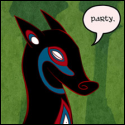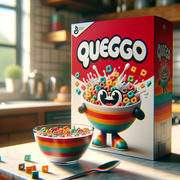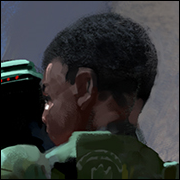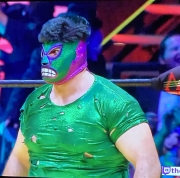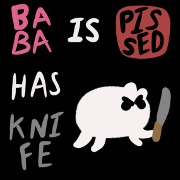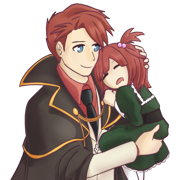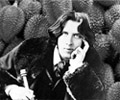|
I'd actually put him against someone like Jose Saramago, who never touched anything like quotation marks or other dialogue indicators. With Saramago it often really is pretty hard to follow who's saying what in the longer dialogues and it's not helped by his dislike of breaking pages out into paragraphs. It works for him, it's his style and he's not hindered by it to my mind, but it's very distinct from McCarthy's clarity.
|
|
|
|

|
| # ? Jun 4, 2024 07:08 |
mewse posted:This is the voting thread if you are dumb like me and can't find it Yes, thank you, sorry, juggling some things. I should have inserted that myself
|
|
|
|
|
Iíve read a few other lit authors that donít use quotation marks and Iíve rarely found it a problem.minema posted:Yessss exactly, do you have anything published? Not yet. Iím in the final edits of the first book, and have 5 more in various draft stages in my series. Iím probably gonna start publishing it as a web serial, because I donít know of any publisher whoíd be down for a 6-12+ book series from a total unknown. Also itís kinda picaresque, so serial format would probably work really well Stuporstar fucked around with this message at 22:31 on Feb 29, 2024 |
|
|
|
The Two of Swords: Volume Two by KJ Parker - $1.99 https://www.amazon.com/dp/B06Y5685GX/
|
|
|
|
Harold Fjord posted:The sequel might cheer you up Hey that didn't cheer me up at all, it was every bit as bleak.  Good though. But bleak.
|
|
|
|
Iím catching up on the last few pages. I agree that Baru isnít bleak really because it does present the idea that itís possible to change society for the better. Contrast that with books by Abercrombie and Parker where even rare attempts to do so are met with ruin because of unintended consequences or humanities general shittiness. Those books can be more fun to read and seem less bleak though because they use so much humor, laughing at the characters futile attempts to even imagine they could make progress for themselves let alone the world.
|
|
|
|
Gaius Marius posted:And is there ever a moment McCarthy is unclear? His prose is precise enough that they would only be a distraction. Problematic Pigeon posted:And McCarthy has such a good ear for dialogue you don't really need quotation marks to tell when narration ends and dialogue begins, and each character has such a specific voice it's always clear who is talking in a conversation. I think it depends. I remember reading The Road a couple years back and not having any issues with understanding or parsing dialogue from narration. Then last year I read Stella Maris and it drove me insane. It seems like he went out of his way to make it even MORE unclear, ironically by removing all narration and having it be purely dialogue. You'd think this simplify things, but what kept tripping me up was there's never any indication of who's speaking. Now, sure, it's only two characters speaking, alternating back and forth. A psychologist and a patient, so most of the time it's pretty clear from context who's talking. A note at the beginning indicates that everything is a transcription of the recordings of their sessions. Except...who the gently caress would create a transcription without any indication of who's-saying-what? Or any indication of pertinent facts from the recording like "patient began to cry" or "patient was silent for several minutes", etc? You have to glean this from little hints here and there but nothing's clear, and lots of other details are simply not mentioned at all. Why? Because literally the only thing on the page is the words the characters said. Not how they said them, and anything else that might be valuable for the reader to know: body language, non-verbal actions like gestures, facial expressions...nope! Unless somebody verbally says something out loud, you are completely in the dark. Again, most the time you can still figure stuff out from context clues, but the way he wrote the dialogue makes it challenging. Lots of short or one word responses. Lots of one person repeating what the other just said (especially the one word responses). Lots of times where one character will imitate what they think the other character is going to say, and so on. Basically, stuff that only becomes difficult to parse if you intentionally remove all indication of who's talking and how they're saying it. And most of the time without punctuation so you have to intuit the tone or tenor of the conversation purely on vibes. What drove me over the edge was one particular section where the order of who-was-saying-what seemed to mess up. Like, they're alternating back and forth but at one point it's like "okay this should definitely be the doctor talking but he's saying things that don't make sense for him to say, and would only make sense of the patient was saying it instead", and the following line is the same but vice versa. Is it a formatting mistake? Did McCarthy forgot to put a line break somewhere, or put one where it doesn't belong? Was it intentional? Am I just misinterpreting and this is another instance of characters imitating each other (for the entire rest of the chapter)? Who knows! Ugh. It definitely made me hesitant to pick up the companion novel.
|
|
|
|
MockingQuantum posted:I read it that "I think the cross-genre march of coziness is evidence for the Kestral theory" was a twee, complicated goon way of saying... well honestly I have no idea, I don't think the post you were responding to made a ton of sense to me tbh. But basically arguing "cozy fantasy showing up everywhere makes me agree with Kestral's read on why Baru Cormorant could be called bleak" Kestral posted:For my money, the Baru books are pretty high on my bleak-o-meter not because of the state of the world, but because extraordinarily awful things happen to the protagonist, a lot, in ways that are realistically rendered to the point of horror, and her life is a sine wave of extreme competence followed by extreme helplessness and futility. Her suffering is rendered in high fidelity and it goes on a long, long time. Milkfred E. Moore posted:It's why I've never been able to get aboard the cozy train despite being an absolute sap. I feel like it is something like what Battuta mentioned, especially with how it's cozy fantasy and not cozy sci-fi: fantasy these days feels a lot like a genre in which you can have the trappings of modernity without the systems that allow them to exist and the history that enabled it. So, you end up with Gnomish technologies and elf magicks making coffee shops and air conditioning possible, because the ultimate fantasy ( Then I talked about other genres because--and it seems like I never quite said this part--cozy SF and especially cozy mysteries and other forms of contemporary coziness don't free the reader from the weight of history in the same way that Milkfred says is happening with cozy fantasy. Whatever it is that makes people to want to read coziness in the other genres, I assume there's a good chance it also applies to cozy fantasy. Maybe I'm mischaracterizing Milkfred anyway, I don't know quite what their reference to cozy sci-fi meant. However even though I tend to feel like Kestrel in general, I personally don't find the Baru books very bleak, I think because Baru retains a lot of agency despite going through tough things. Iain Banks' Consider Phlebas or Matter strike me as way more bleak than Baru, for example. Exordia also felt quite a bit more bleak than Baru, but I enjoyed it a lot more than Banks' powerless protagonists because I really liked what I took to be the artistic project of making me as a reader feel (as Earth gets betrayed and bombed) just a tiny little bit like what Kurds must have really felt when they got betrayed. Whereas Banks sometimes just felt nihilist to me. Just Banks going, "lol nothing matters dude".
|
|
|
|
Am I the only one who thinks of bleak as situations that are hopeless, actions futile, with no likelihood of that ever changing? Bad things happening to the main character just sucks for them. And I thought The Road ended with a glimmer of hope Bilirubin fucked around with this message at 05:44 on Mar 1, 2024 |
|
|
|
|
It did
|
|
|
|
Lex Talionis posted:However even though I tend to feel like Kestrel in general, I personally don't find the Baru books very bleak, I think because Baru retains a lot of agency despite going through tough things. Iain Banks' Consider Phlebas or Matter strike me as way more bleak than Baru, for example. Then you either should, or very much shouldn't, check out Banks' Against A Dark Background. It's beautifully, artistically bleak with extra helpings of nihilism and fantastic set-piece scenes. The title says it all. It's closer to Phlebas than Matter.
|
|
|
|
mllaneza posted:Then you either should, or very much shouldn't, check out Banks' Against A Dark Background. It's beautifully, artistically bleak with extra helpings of nihilism and fantastic set-piece scenes. The title says it all. It's closer to Phlebas than Matter. Use of Weapons >> Player of Games > Against a Dark Background, Feersum Endjinn, Look to Windward, Excession > Hydrogen Sonata, Algebraist, Consider Phlebas > Matter, Surface Detail, Inversions >> Transitions
|
|
|
|
Bilirubin posted:Am I the only one who things of bleak as situations that are hopeless, actions futile, with no likelihood of that ever changing?
|
|
|
|
Arsenic Lupin posted:Amal El-Mohtar is a multiple-award-winning SFF writer, who writes both SF and fantasy, and who edits a "fantastic poetry" quarterly. You may disagree with her take, but she's an informed reader. How easily we forgot the Bigolas Dickolas Wolfwood event 
|
|
|
Gaius Marius posted:It did well, good. my memory is bad but not that bad I guess. Arsenic Lupin posted:That's exactly how I feel. I'm despairing on my own time; right now I cannot handle books that despair also. Can I recommend a nice, cozy book? Suiting the tenor of our times
|
|
|
|
|
pradmer posted:The Two of Swords: Volume Two by KJ Parker - $1.99 If you all want some bleakness, this series is it.
|
|
|
|
parara posted:Oof, Sarah J. Maas. Nah you can have fun with that one on your own. At least it's not Chani Lynn Feener's Devils of Vitality. Lmao. In other news. Premee Mohamad's 'The Butcher of the Forest' was a neat short story [novella?] of fairy tale forest fuckery. I really need to finish this author's Beneath The Rising trilogy.
|
|
|
|
Confusedslight posted:With everything going on *gestures broadly at the world The Gap cycle by Steven Donaldson is a nice palette sensitizer.
|
|
|
Lex Talionis posted:Whereas I read Milkfred as saying they thought the fundamental appeal of cozy fiction is escape from the guilt of capitalist consumption. If so, that really has nothing to do with what the protagonists go through. I had a big post written up and I must've tapped F5 and made it vanish because I lost it thirty seconds ago and I'm not sure why or how. So, uh, quick and messy. I don't think you mischaracterized me. Basically, I'm curious as to why it is "cozy fantasy" and not "cozy sci-fi" when as far as I'm concerned both genres allow for "cozy" stories. I do some editing work for a manga company and almost everything I work on is "cozy" and almost everything is some kind of isekai fantasy where an overworked salaryperson ends up in a generic fantasy world where the stakes are short and the slices of life are very broad. Elysian fields, unexplored forests, anachronistic food stalls... And I keep wondering why that is, when getting teleported to a post-scarcity sci-fi world would achieve the same thing, but I don't see it or hear about it. Like, okay, I get the appeal of elf babes and hunks, but surely space elf babes and hunks are just as alluring? It's not just manga, though. I think recent trends in western publishing are echoing the same anxieties (because everyone knows the 9-5 life we have is not great, it's not just a Japanese thing), it's just that manga is much more open about having audience self-inserts. Like, why is Legends and Lattes about "Viv the orc barbarian" and not "Viv the genemod cyborg?" Even if we allow for 'that is what the author wanted to write' I think there's a lot of baggage that sci-fi/setting something in 'our' world/the future inherits that fantasy allows you to get around by depicting a universe with no relationship to our timeline. So, fantasy, either through genre conventions or audience expectations or both, is more open to the "trappings of modernity without the systems that allow them to exist and the history that enabled it" and I think that's why we see "cozy fantasy" and not "cozy sci-fi." While a lot of this stuff involves the protagonist being the first to invent coffee or hot dogs or whatever, I don't think that's why it's all fantasy. Of course, my definition of "cozy fantasy" could be narrower than others, but my understanding of the contemporary meaning is that it's that low stakes, no one hurts type of adventure. The characters get what they want, readers get what they want, and drama is generally muted or reasonable. But I also think about how it feels like the isekai works I've seen have even moved away from the protagonist dying to get to the fantasy world, instead making it divine intervention, a weird dream, or something else kind of 'magical' because the thought of leaving behind grieving family and coworkers, even when the story never cares about the first world again (pun not intended) is too stressful. Which comes back to what Battuta said about how the message they take from it is what I take from "cozy fantasy": things will only be good in a completely different universe. tl;dr: the bleakest thing I've read is not that self-awareness is an evolutionary trap or the importance of drowning your lover to prove your worth to a eugenicist empire, but a nameless Japanese salaryman coming to a world of monsters and magic and seeing no more grandiosity than that of a modest home (not even a mansion) and a doting girlfriend (not even an elf) Milkfred E. Moore fucked around with this message at 09:54 on Mar 1, 2024 |
|
|
|
|
shirunei posted:The Gap cycle by Steven Donaldson is a nice palette sensitizer. You monster. The Gap Cycle is Content Warning: The Series.
|
|
|
|
Most cozy fantasies are ultimately pastoral fantasies with a generous helping of power fantasy. It's definitely possible to do that in a science-fantasy setting (the video game Slime Rancher springs to mind), but it's ultimately just simpler to use a generic fantasy setting. Using an earth-derived setting brings a ton of baggage thay the reader for a subgenre like 'cozy' isn't going to have a lot of patience for.
|
|
|
|
Fantasy is cozy, because it offers the reader the tantalizing notion of having a non-threatening ethnic friend. Science fiction is not cozy, because it terrifies the reader with the prospect that the help may have internal lives of their own.
|
|
|
|
Arsenic Lupin posted:Amal El-Mohtar is a multiple-award-winning SFF writer, who writes both SF and fantasy, and who edits a "fantastic poetry" quarterly. You may disagree with her take, but she's an informed reader. (the question of "what is science fiction" is way too broad for me to pin any book, including Baru, down to a genre) edit: figured it out. it's robots. or spaceships. (really though it's all down to vibes and I came back to edit in my vague memory, that hopefully the General can refresh, of that absolutely bonkers review of the first Baru that said something like "science fiction set in a universe where women are better than men at math") DACK FAYDEN fucked around with this message at 13:09 on Mar 1, 2024 |
|
|
|
Milkfred E. Moore posted:I had a big post written up and I must've tapped F5 and made it vanish because I lost it thirty seconds ago and I'm not sure why or how. So, uh, quick and messy. Anyway thanks for the interesting perspective. I really don't know much about isekai but since those are usually structured so that someone is trading our world for a different one I can see how you're keying in on that. Still I have a couple of thoughts: 1) I don't know about Japan but here in the west, fantasy is overall much more popular than science fiction. Lots of today's readers grew up reading and watching Harry Potter and playing fantasy RPGs. For a lot of people, the ultimate in coziness is to indulge nostalgia for their memory of childhood. If they associate orcs and elves with their youth, that's going to be more cozy for them. I assume this is also what's going on with "LitRPG"...a lot of adults today spent more time playing World of Warcraft as a teenager than reading SF, going to school, talking to people in the real world, etc. So when adult life is producing anxiety, that's where they turn. 2) I also don't know enough about manga to say this but I'll throw it out there: doesn't fantasy lend itself better to manga and anime? You can draw elves and orcs just as cheaply as you draw humans so you have a competitive edge against live action TV and movies. And while you can draw SF certainly, I don't know if lends itself quite the same way. It's easier to draw a sword fight than a space battle, I think? People are just closer together. 3) A generation of YA SF books and films have been completely infested with Hunger Games-style dystopias. Some might want to say that's because the world sucks and we're ruining it for our kids, but personally I think it's just because dystopias turn out to be a pleasantly over-the-top metaphor for the average teenage's experience of their parents, high school, etc. At any rate this has brainwashed (or educated, if you prefer) impressionable kids into thinking the future is a ghastly place, so when they grow up they don't look there for coziness. Haystack posted:Most cozy fantasies are ultimately pastoral fantasies with a generous helping of power fantasy. It's definitely possible to do that in a science-fantasy setting (the video game Slime Rancher springs to mind), but it's ultimately just simpler to use a generic fantasy setting. Using an earth-derived setting brings a ton of baggage thay the reader for a subgenre like 'cozy' isn't going to have a lot of patience for.
|
|
|
|
There's a much bigger tradition of sci-fi manga and anime than there is of fantasy. Fantasy manga are very popular now, but that's a reasonably new phenomenon. Modern manga basically started out doing sci-fi (Astro-boy etc).
|
|
|
|
Fantasy manga as we know it essentially started as Let's Plays of D and D sessions in the 80s, so far more recent than Sci-Fi manga. That's if we ignore manga that was grounded in Japanese folk lore. Although, Tezuka did at least one conventional Prince and Princess type fantasy inspired by Disney early on iirc.
|
|
|
|
grassy gnoll posted:Fantasy is cozy, because it offers the reader the tantalizing notion of having a non-threatening ethnic friend. I love cozy fantasy and I'll have you know I have plenty of ethnic friends. Though I don't totally disagree.
|
|
|
|
re: "cozy fiction vs bleak fiction and why you read" I usually read to get myself out of reality. I'm extremely ostrich head in sand when it comes to real life, especially politics, as I have powerful anxiety and thinking about something as devastating as climate change can give me a panic attack. I aggressively do not follow the news, I do not stay informed, I mute as much politics chat as possible. My partner respects this and keeps me informed of the big recent stuff I should know - Ukraine is still trying to keep Russia out of their territory, McConnel (bastard) will be stepping down as majority leader (but staying on as a policitian, god) - for example. And I vote. I do my part as an American citizen. But when it comes to reading sci-fi/fantasy, I want to leave this reality. Which... does lead to this weird divide. I can read Tom Clancy's Rainbow Six. I can read King Leopold's Ghost  -- I can read about real things, basically, but they have to be in the past. I can watch Star Trek SNW/LD/Orville and they can tackle current subjects, because it's dressed up enough. -- I can read about real things, basically, but they have to be in the past. I can watch Star Trek SNW/LD/Orville and they can tackle current subjects, because it's dressed up enough.But some things, for reasons I struggle to explain, skip past those barriers and squick me. Baru Cormorant ran right in and got me in those emotional sore spots, and so I can't finish reading it. This isn't a knock against the book, but just that I'm respecting my own boundaries. To wrap back around - I read to escape reality, but I don't need exclusively cozy stuff. Like, sometimes I do and I break out the comfort food, but in general I'll read anything. This also means - I don't mind stepping into the alternate realities where the cozy stuff is fine? They're living happily in an idealized portrayal of a capitalist society with a working police force and no racial tension exists? This is fantasy. I am reading fantasy... and I enjoy going there, sometimes.
|
|
|
|
Cozy fantasy vs scifi: Fantasy is rooted in the familiar, but with the reader knowing more about the world than the backwards pastorals. It's intuitive. It's (for the most part) asking what-if by subtracting modern things with an element of wish fulfillment via magic. Science fiction is inherently unfamiliar, adding complexity onto the modern day. This makes it less cozy. Gross simplification, but we're talking in sweeping generalities anyways. I've had this ponder before.
|
|
|
|
I was Going Through Some Stuff recently and needed absolutely brainless fiction to distract myself. I read a few of the DS9 relaunch novels, which were the easiest things I've ever read, and they worked great. There's no moral imperative to read challenging literature or stuff that stress you out, reading is supposed to be enjoyable.
|
|
|
|
Iím unsure how ďcozy fantasyĒ translates to power fantasies, unless Iím misunderstanding the genre. Viv the Orc isnít especially a power fantasy to begin with. Becky Chambersí Long Way series (which is sci-fi) isnít a power fantasy if you compare with, say, Tchaikovskyís Final Architecture series. I like these books because ďbig problem that can only be solved by killingĒ sometimes gets really old, plus that kind of story is far more removed from actual life. Iím never going to have to stab fifty orcs or fail to chuck a ring into a caldera, but the problems in ďcozyĒ fiction are closer to actual problems I might encounter. Even something like Goblin Emperor isnít especially a power fantasy, unless you think ďbeing such a good person that even some cynical politicians start to noticeĒ is a superpower. One of the messages of the book is absolutely that the title of emperor conveys pretty limited power in itself. I also wonder what the thread thinks about writers like Lawrence Watt-Evans, who sometimes writes books where nobody dies and that deal with magical but ďmundaneĒ problems like ďwizard accidentally has his soul spread across animated furniture, some of which then runs off.Ē Because I think his coziest books arenít the power fantasies at all but either about magic-users having to solve a magical problem through mundane means, or normal people whose lives get screwed up when someone tries to use magic to solve a mundane problem. If itís true that ďcozy sci-fiĒ isnít a thing, Iíd speculate itís because magic can completely break down the assumptions of capitalism, but in sci-fi you demand an explanation if things have gotten ďpost-scarcity.Ē I would wonder whether much of the run of Star Trek: The Next Generation should be classified as ďcozy,Ē for instance.
|
|
|
|
Narsham posted:I also wonder what the thread thinks about writers like Lawrence Watt-Evans I absolutely adore Lawrence Watt-Evans and not just Legends of Esthshar. The coziest stories are ones where nothing stupid happens, like drama from people not talking or characters that act without thinking. Slyphic fucked around with this message at 16:41 on Mar 1, 2024 |
|
|
|
cozy seems more like a reflection of the reader than the book to me. maybe there's someone out there whose idea of cozy is a blood curdling horror novel and a cup of tea
|
|
|
|
Sometimes I want a good stiff drink, sometimes I want sleepy time tea As long as I don't get served one of those when I've ordered the other, both are good in their place
|
|
|
|
|
Is the Misenchanted Sword cozy? It eschews large scale heroics, nobody becomes a broken person who gives into despair and ends up with people in their happy settled small lives. I would say the BlackTongue Thief is not cozy though it has a pretty light tone. Thought thinking more about it I think my sense of cozy mainly has to do with if the characters end up in a literal cozy environment with warm shelter or if they're stuck wandering in the exposed environment. I think I'm more literal.
|
|
|
|
This has been a really good convo, I enjoyed reading it. Nice work thread!
|
|
|
StrixNebulosa posted:re: "cozy fiction vs bleak fiction and why you read" I was like this for a lot of 2019 and 2020. I'm coming out of it now. Basically there was a period at the height of Trump and Covid, while working as a public defender, where anything that added an iota to my stress level went into the "to be read later" pile. Like, the existence of narrative tension was enough to push a book into the "not now" pile. We watched a lot of cartoons and sitcoms during covid. I'd still buy books I intended to read later, I just didn't read them right then. I'm in a much better place now and find the old reading muscles asking to be stretched again, partly because I have time, partly because the eschaton doesn't seem quite so ponderously immanent at the moment. So I'm finally making progress on that TBR pile.
|
|
|
|
|
Yaoi Gagarin posted:cozy seems more like a reflection of the reader than the book to me. maybe there's someone out there whose idea of cozy is a blood curdling horror novel and a cup of tea Me. I'm one of those people. This is definitely a really fascinating topic since there's at least one definition of "cozy" (and it's the one I usually struggle to enjoy) where people seem to mean "a single scene in a Ghibli movie where something nice or whimsical happens - but stretched out to novel length" which ignores how much of the cozy scenes in Ghibli movies rely on the context that they're often more holistically about loss, grief, war, etc. It's the contrast between the roughness and the softness that makes Ghibli stuff (for example) work so well. Another example off the top of my head, I loved the Redwall books when I was a kid, and they have very cozy moments, but most of them also had some pretty gruesome violence and peril too. It's what made the safety/relaxation of an ornately described Redwall feast actually mean something. But if the book is nothing but cozy feasts 24/7, I'd lose interest pretty quickly. E: I guess what I'm really looking at when I read is for things to have some sort of ebb and flow, some kind of dynamic contrast, even if the overall thing is intended to feel cozy. I want the tempo and the keys the change. DurianGray fucked around with this message at 18:39 on Mar 1, 2024 |
|
|
|
Ccs posted:Contrast that with books by Abercrombie and Parker where even rare attempts to do so are met with ruin because of unintended consequences or humanities general shittiness. Those books can be more fun to read and seem less bleak though because they use so much humor, laughing at the characters futile attempts to even imagine they could make progress for themselves let alone the world. That's an interesting take, especially for Abercrombie, because it's not until the very end of the third book in the first trilogy that this is made well and truly clear. Up until then, things happen that give cause for hope, both for the characters and society as a whole. Does that mean, then, that you don't know something is bleak until the story plays out in its entirety? I am not sure I agree with that.
|
|
|
|

|
| # ? Jun 4, 2024 07:08 |
|
DurianGray posted:Me. I'm one of those people. The kushiel books are interesting for this, each one is typically incredibly cosy for the first 2/3 then Holy poo poo we are infiltrating the sex torture cult in the land of murder arrrgh
|
|
|





















